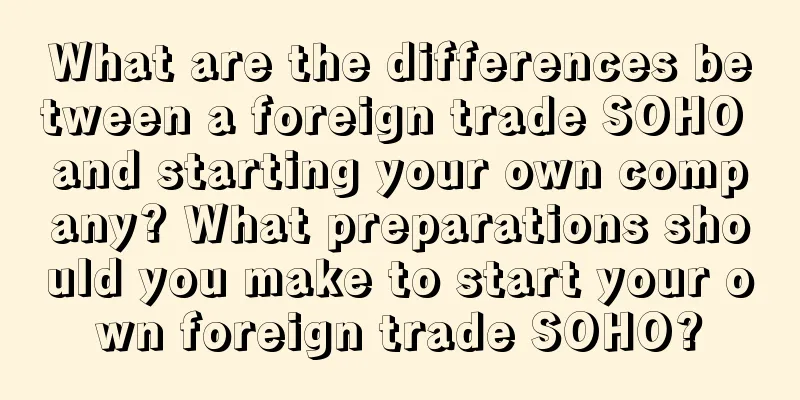What are the differences between a foreign trade SOHO and starting your own company? What preparations should you make to start your own foreign trade SOHO?

|
Foreign trade SOHO (Small Office Home Office) and traditional company-owned business are two different foreign trade business models, each with its own unique advantages and challenges. This article will explore the differences between foreign trade SOHO and starting your own company, as well as the preparations you need to make to become a foreign trade SOHO. 1. What are the differences between foreign trade soho and starting your own company? Scale and resources: Foreign trade SOHOs are usually smaller in scale and have limited resources, while a company may have a larger scale and more resources. Cost and investment: The initial cost and operating cost of the SOHO model are relatively low, while starting a company requires more initial investment and continuous financial support. Flexibility and freedom: Foreign trade SOHO has greater flexibility and freedom and can respond quickly to market changes, while company operations may be subject to more rules and regulations. Risks and responsibilities: The risks borne by an individual as a SOHO are relatively small, while starting a company requires taking on more legal responsibilities and business risks. Market positioning and customer relations: Foreign trade SOHOs may focus more on specific market segments and building personal brands, while companies may pursue a broader market and customer base. 2. What should I prepare to do foreign trade SOHO? Market Research: Gain in-depth knowledge of target market needs, competitors, and potential customers. Product knowledge: Be familiar with the characteristics, advantages and market positioning of the products you want to sell. Marketing strategy: Develop an effective marketing plan, including online marketing, social media promotion, etc. Supply chain management: Establish a stable supply chain to ensure product quality and timely delivery. Customer Service: Provide high-quality customer service and build good customer relationships. Legal and tax knowledge: Understand relevant laws, regulations and tax requirements to ensure compliance with regulations. Financial Planning: Develop detailed financial plans, including budgeting, cash flow management, and risk control. Technical tools: Use technical tools such as CRM systems and project management software to improve work efficiency. Foreign trade SOHO and starting a company each have their own advantages and disadvantages. Which model to choose depends on personal goals, resources and risk tolerance. |
<<: Is it necessary to pay to register a Google account? How to register a Google email account?
>>: What is the annual income of SOHO foreign trade? Is it too late to start SOHO foreign trade now?
Recommend
What is Lazada P-Card? What is it used for?
Merchants who want to open stores on the Lazada pl...
How does Amazon analyze the market? What aspects does it analyze?
Amazon is the best developed cross-border e-commer...
Big brands can’t shrink
In the wave of China's economic development, l...
Seven things marketers can learn from "The Rush"
Recently, the TV series "Kuangbi" is ver...
I went to deliver food, let's see how much money I made
This article mainly shares the process and specifi...
Dong Yuhui resigns, and the “de-Hui” of Oriental Selection is a foregone conclusion
Yesterday, Dongfangzhenxuan announced that Dong Yu...
The "huge wealth" of bees and flowers cannot be achieved by relying solely on free traffic
As the Li Jiaqi incident continued to ferment, tra...
What should I do if Amazon Europe does not have VAT? What does Amazon Europe VAT mean?
Dear Amazon merchants, if you want to open a store...
Is Maomao Jie popular again? One person sells goods worth tens of millions, and 260,000 people are online within 10 minutes of the broadcast
On December 17, Maomaojie and her busy live broadc...
Video account, more like a cultivation system
Video accounts have opened up new growth space and...
How to join Alibaba cross-border e-commerce? What should I do?
Many domestic merchants do not want to open stores...
"WeChat" merges with "TikTok", the first 1 billion-level traffic dividend is coming in 2023...
With the advent of the new data era, what changes ...
DHgate.com New Seller Protection Period Policy
The Dunhuang platform guides new sellers to unders...
Apple, no more magic
Still brainwashed by the "far ahead" slo...
UP Master Crossing Regions, a "Big Gamble" on Traffic
This article introduces the phenomenon of UP hosts...









